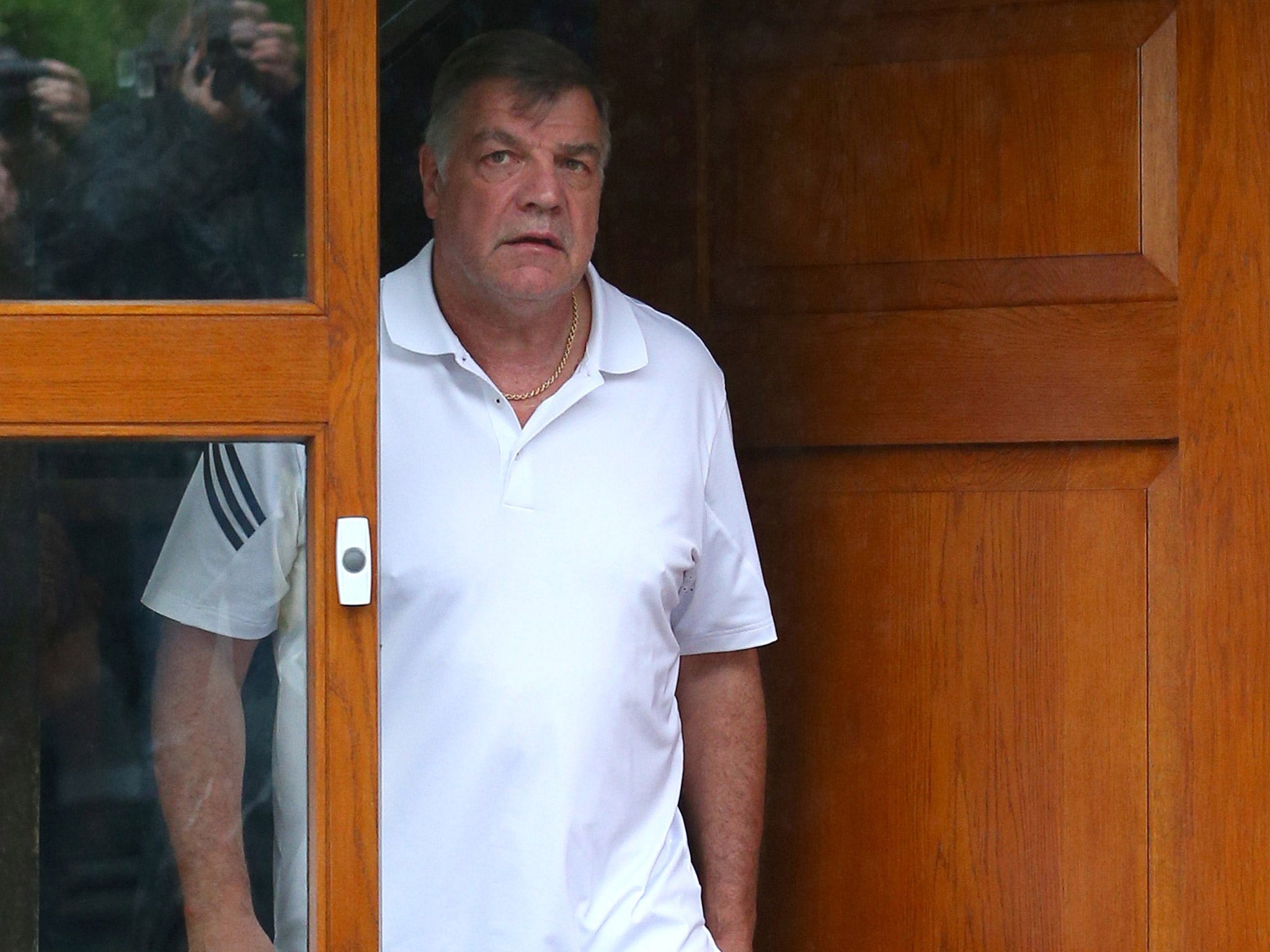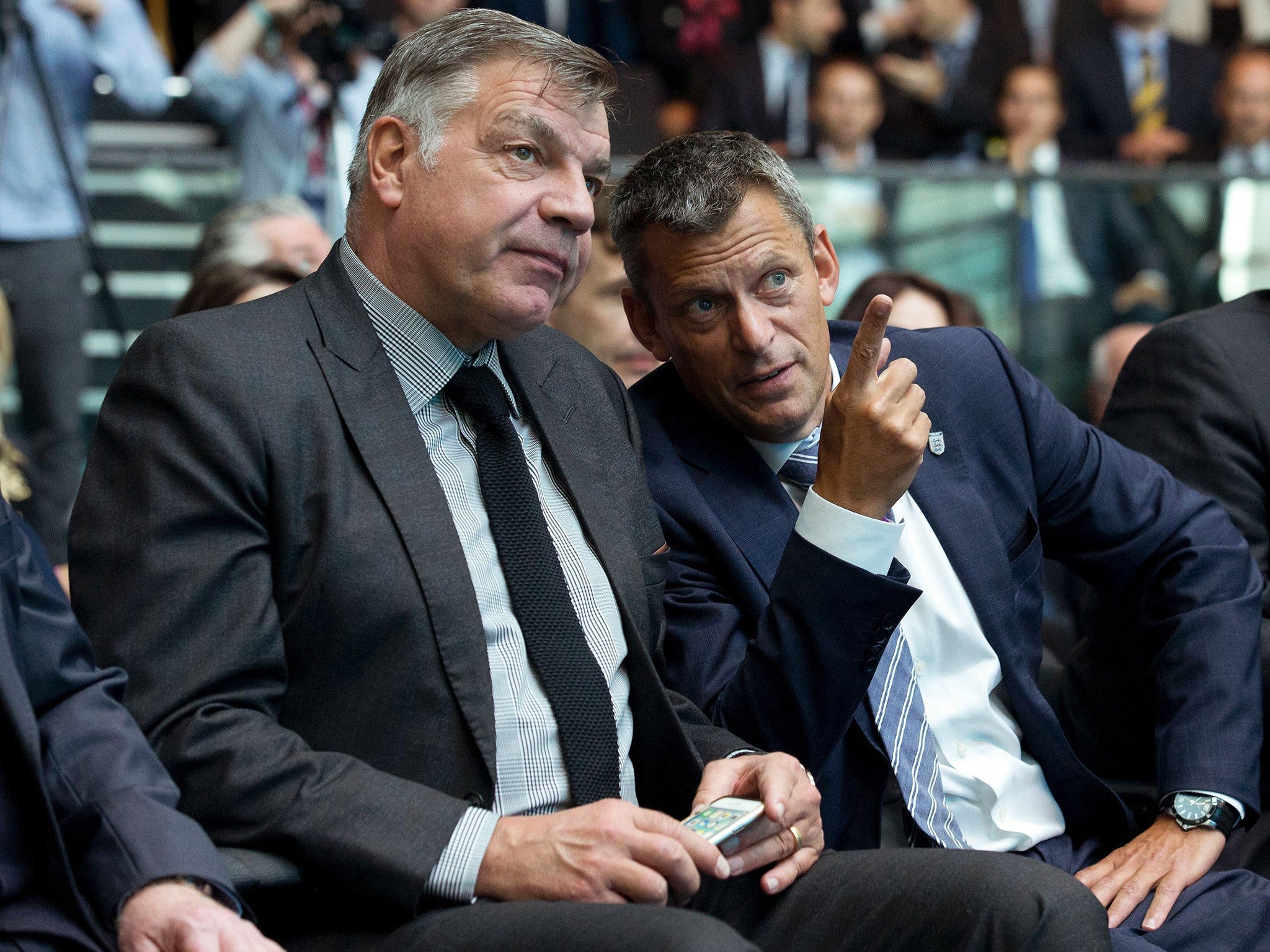FA: We warned Sam Allardyce to tread carefully in role as England manager
Martin Glenn says governing body knew fallen leader was 'brash' but thought he was a 'winner'

Your support helps us to tell the story
This election is still a dead heat, according to most polls. In a fight with such wafer-thin margins, we need reporters on the ground talking to the people Trump and Harris are courting. Your support allows us to keep sending journalists to the story.
The Independent is trusted by 27 million Americans from across the entire political spectrum every month. Unlike many other quality news outlets, we choose not to lock you out of our reporting and analysis with paywalls. But quality journalism must still be paid for.
Help us keep bring these critical stories to light. Your support makes all the difference.
It is safe to assume that Sam Allardyce was not drinking pints of wine when he fulfilled one of his lesser known hotel engagements in September.
Across the table from him on that occasion, at a Soho establishment in central London, was the FA chief executive Martin Glenn - the man whose organisation had put just £3m a year plus bonuses his way, rather than the £400,000 floated by undercover reporters at a Mayfair establishment that same month. Glenn was evidently doing the talking rather than Allardyce – the one who’d held court on third party ownership of footballers, Roy Hodgson, Prince Harry’s backside and associated topics with the reporters.
“I remember specifically saying to him: 'Sam, look we’ve both got to work together',” Glenn said of their meeting. “I told him: ‘I’ve been at the FA 18 months, you’ve not done the England job, so here’s what I’ve learnt. Everything you say is going to be under a lot of scrutiny. Your decision-making is like doing it in a goldfish bowl and crucially, anything you say to anybody, just feel comfortable that it might be printed the next day'.”
The point was reinforced in a subsequent discussion between Allardyce and the FA’s director of communications, Amanda Docherty, and as the 61-year-old embarked on preparing for his first match in charge, the notion of him blithely disregarding their requests for dignified professionalism seemed highly improbable. That’s because what struck Glenn most about Allardyce was his how desperately he’d wanted the job in the first place. “He was the most thoughtful in all of the interviews about the psychological ‘fear factor’ which we think has bedevilled England over the years. He gave by far and away the best answers [on] those,” Glenn said.
The chief executive said back in July that his recruitment experience in running big businesses – United Biscuits, Walkers Snack Foods and Birdseye – were what he brought to the piece, as the FA launched its search for Hodgson’s successor. If he’d been replacing a finance director in any of those businesses, Allardyce’s prominence in the Stevens Report, which the Premier League launched and funded in 2006, and a Panorama documentary might have rung alarm bells. But if that body of work should have been a cause of concern, then no one – either in the media or in the FA’s integrity unit – raised it this summer. The FA has been impugned this week for having hired Allardyce in the first place, though the only objection at the time in the school of public opinion was that ‘Big Sam’ lacked sophistication.
Glenn was impressed with Allardyce’s place on the board of the League Managers’ Association: “a pretty prestigious role and you don’t get on to that lightly. He was seen to be a stalwart of the game.” Under pressure to replace Hodgson quickly, and feeling the heat of Sunderland publicly fuming over the FA’s entirely legitimate approach for their manager, he began asking around about him. Though even that was tricky in the football goldfish bowl where confidentiality seemingly doesn’t exist. “If you ask competitors [about Allardyce], they become aware.”

Glenn declared the day after England exited Euro 2016 to Iceland that psychological “brittleness” was their problem on the big occasions and it was his assessment that delivering a manager with personality was paramount, even if that individual might be noisy. “Yes he’s Sam and he’s loud so we did understand that he’s not going to be the quietest person,” Glenn reflected on Friday. “We knew he was a man of the world. He’s brash but he is in the middle of the fairway in terms of behaviour.”
All told then, a recruitment process with the logic you would expect of someone with Glenn’s professional antecedents. But what he did not factor in was the greed; the unmitigated desire for more and more money which drives so much of the conduct which has been revealed by the Daily Telegraph’s stings this week.
“It wasn’t the case that he was left like an innocent in the woods,” he said. “Which is why the thing was ever more a surprise. I do feel let down because I genuinely think for football reasons he was a really good choice and just what we needed after the Euros.”
The "thing" began unravelling at FA headquarters on Monday afternoon, when Glenn received a telephone call indicating there might be a serious problem. Allardyce, back at home in Bolton for a golfing event, also immediately telephoned into Wembley. A conference call was immediately convened between him and senior FA executives. On Tuesday morning, Glenn, chairman Greg Clarke and Docherty met to hammer out an understanding of the established facts and issues. An interview with Allardyce was scheduled for 1pm. It had finished by 2pm and by 3.30pm the FA had told him his England managerial career was over.
“I think he accepted that,” Glenn said. “I felt personally really bad for him. This is a guy who has wanted the job forever and realised he had made a colossal mistake and was broken by it but he was not in denial and he actually accepted it. We didn’t get any of the angry behaviour I might have expected. It was a deep sigh and resignation, saying: ‘I realise I messed it up’ and I think he has been consistent in saying that.”
Allardyce subsequently protested that “entrapment has won" though Glenn will not enter the territory of whether the Telegraph’s way of working was justified. “He [didn’t deny or question with us] that the method of entrapment resulted in his behaviour or what he was called out for.”
To the question of whether another desperately bad week for the sport has taught him that hiring football managers is a challenge like none other, he insisted that he will apply the same criteria now as he did in July. “We want to get winners and one of the things that appealed to us about Sam was that he was a fighter and a winner. We are in the most competitive game on the planet, and we want people with the criteria to thrive in that. And we’ve got form with England – we have not won anything for 50 years, so we have got to be open-minded about it. And football is also different in the sense that you are always hiring in a goldfish bowl. It’s hard to keep things confidential.”
Glenn deserves some acknowledgement for his prompt action. Condemnation of him for hiring Allardyce in the first place is unjustified and flavoured with hindsight. But this was certainly the week when he discovered that football is not like selling frozen fish. Football and its inconspicuous wealth can be a cesspit, we have discovered yet again, though the man hired to run the national side of things put it more decorously. “It’s a rough and tumble old game,” he said.
Subscribe to Independent Premium to bookmark this article
Want to bookmark your favourite articles and stories to read or reference later? Start your Independent Premium subscription today.
Join our commenting forum
Join thought-provoking conversations, follow other Independent readers and see their replies
Comments